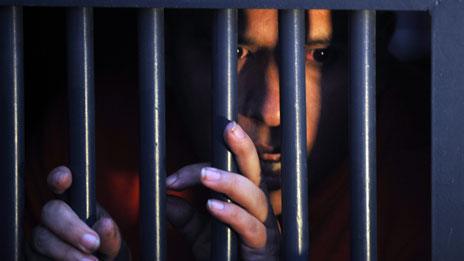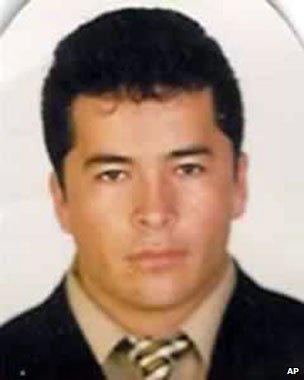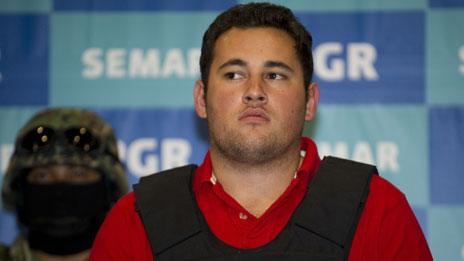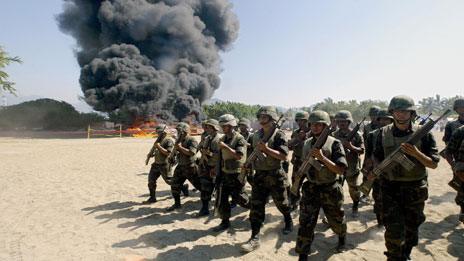Heriberto Lazcano: The fall of a Mexican drug lord
- Published

Heriberto Lazcano, the leader of Los Zetas, one of the Mexico's most feared and brutal drugs gangs, was killed this week in a shoot-out with the Mexican marines. This news was not a major surprise to Mexico-watchers - but then something strange happened.
The life of a drug lord is generally pretty short.
The world's most notorious was probably "El Patron" - the Colombian cocaine baron, Pablo Escobar, who died aged 44, barefoot, bloated and riddled with bullets on a rooftop in Medellin.
Most do not rise that high in the drugs trade, though, nor live that long to tell the tale.
We receive constant reports from the Mexican attorney general's office of supposed lieutenants and middle-ranking soldiers from gangs like the Sinaloa Cartel, the Gulf Cartel and Los Zetas who have been murdered by their enemies or killed in shoot-outs with the authorities.
They are more often boys than men.

Twenty or 22 years old, their hands tied behind their backs, a bullet to the head, dumped on the roadside. A final adios to an all-too-brief life which brought them fleeting riches, cars and women.
By his industry's standards, then, Heriberto Lazcano was a veteran.
He was my age, born in 1975, and over this past year, covering the twists and turns of his murderous and violent organisation, I have often thought of that fact - and wondered what took a supposedly loyal Mexican soldier and turned him into the watchword for drug-related terror in his homeland.
The only photo we ever saw of Lazcano alive shows a young man, in his military days, wearing a beige shirt, dark jacket and tie, staring impassively at the camera, revealing nothing of the murderer - "The Executioner", as he would later be nicknamed - that lay within.
The photo we saw this week of El Lazca showed him lying dead on a slab. Naked, with his eyes closed, his hairline had receded a little over the years and his mouth looked puffy and damaged. But it seemed to be him sure enough.
Mind you, the Mexican authorities were slow in officially confirming the death.
When the first reports started to come in late one night that, perhaps, the head of Los Zetas had been killed, it did not come as any huge surprise.
The organisation has been tearing itself apart for months now, as one faction appears to be telling the authorities where to find their former comrades.
The marines said they were waiting for DNA evidence on Lazcano, conscious, perhaps, of the last time they made a song and dance about a big name, which quickly turned into a PR disaster.
Earlier this year, the authorities said they had detained the son of the world's most wanted man, Joaquin "El Chapo" Guzman.

They brought out a stocky young man dressed in a bullet-proof vest, paraded him in front of the world's media and said for sure he was El Chapo's son.
Then his mother spoke up, and said not only was he not the son of the biggest drug lord in Mexico, he was in fact a used-car salesman from Guadalajara. That one took some speedy back-pedalling.
Still, by the folllowing morning, it should have been clear whether this was El Lazca's body or not. Instead, the story got even more surreal.
The reason for the delay soon became clear. The government no longer had the body.
After El Lazca had been shot outside a baseball game on a dusty patch of land in the northern state of Coahuila, the marines took his fingerprints - without even realising who they had killed - and passed his body on to a local funeral home.

Mexican marines keep guard as seized cocaine is burned
Later that night, on learning that their leader had fallen, the foot-soldiers of Los Zetas - imbued as they are with a sense of military fraternity - stormed the funeral home in balaclavas and with automatic rifles, and took back Lazcano's body. Perhaps to give him their own send off, perhaps to stop word getting out that he was dead and they were weakened. Who knows?
But the lack of a body does two things. It denies the government the trophy it so craves after six years of fighting the gang, leaving the hastily-snapped images in the funeral home as the only evidence that the man so often seen as a monster in Mexico has gone.
Secondly, it introduces an element of doubt. In a country which thrives on rumour and counter-rumour, that is an important weapon for the conspiracy theorists who plague the internet message boards and narco-blogs (which document the events of the drug war in Mexico).
More than once the comparison has been made to the infamous "Senor de los Cielos", Amado Carrillo Fuentes, leader of the once all-powerful Juarez Cartel.
The official version of events said he died under the plastic surgeon's scalpel while trying to change his identity. The surgeons later turned up dead and rumours still abound that he faked his death.
In the case of Heriberto Lazcano, responsible for some of the most gruesome crimes in Mexican history, it seems pretty clear that he died face-down in the mud in the city of Progreso, meaning Progress.
One can only hope that that is what his death will bring.
How to listen to From Our Own Correspondent, external:
BBC Radio 4: Saturdays at 11.30am and some Thursdays at 11am.
Listen online or download the podcast
BBC World Service: Short editions Monday-Friday - see World Service programme schedule.